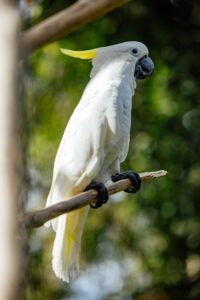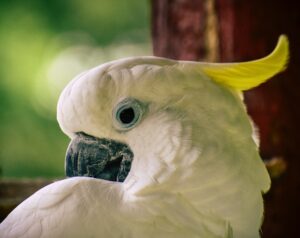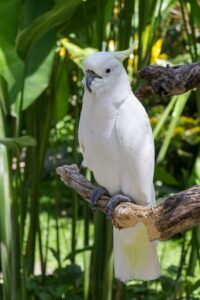Cost of a Cockatoo: What You Should Know Before Buying a Cockatoo

Cockatoo
The Enchanting World of Cockatoos: Cost, Care, and Pure Feathered Bliss
Imagine the joy of sharing your life with an irresistibly charming and affectionate feathered companion. That’s where the Cockatoo, with its endearing social nature and captivating personality, enters the scene. Popular among bird enthusiasts, these delightful parrots make fantastic companions. But embracing a Cockatoo into your life also means embracing responsibilities and considerations. As a gleeful Cockatoo expert, I’m thrilled to take you on an enchanting journey into the world of Cockatoos through this blog. We’ll explore everything from the factors affecting their cost, additional expenses, vital facts you need to know, proper care and nutrition, common health concerns, and, above all, the sheer delight of having a Cockatoo as your feathered amigo.
Unwrapping the Cost of a Cockatoo
Type of Cockatoo |
Price Range |
Size |
Appearance |
|---|---|---|---|
Umbrella Cockatoo |
$1,000 – $2,500 |
Large |
White plumage with a distinctive umbrella-like crest. |
Goffin’s Cockatoo |
$1,500 – $3,000 |
Small to Medium |
White with salmon-pink accents on the cheeks and around the eyes. |
Moluccan Cockatoo |
$1,500 – $4,000 |
Large |
Salmon-pink plumage with a vibrant crest and a white underside. |
Black Palm Cockatoo |
$7,000 – $15,000 |
Large |
Black plumage with a distinctive large beak and red cheek patches. |
Citron Cockatoo |
$2,500 – $6,000 |
Medium |
Lemon-yellow plumage with an orange cheek patch. |
When you’re thinking of the idea of bringing a Cockatoo into your life, one of the first questions that comes to mind is, “What’s the price of a Cockatoo?” Well, the answer to that question is as colorful as these birds themselves, influenced by various factors:
1. Species: The world of Cockatoos is brimming with diversity. The specific species you choose can significantly sway the price tag. For instance, the more common species like the Umbrella Cockatoo tend to be more budget-friendly, whereas rarer species such as the Black Palm Cockatoo can come with a higher price tag.
2. Age: The age of your Cockatoo matters too. Typically, younger, hand-raised Cockatoos come at a heftier price compared to their older counterparts.
3. Color Mutations: Sometimes, you might stumble upon a Cockatoo with unique color mutations or plumage variations, which can make them even more coveted among collectors and enthusiasts.
4. Breeder or Retailer: Your choice of the source matters. Purchasing directly from a reputable breeder may be lighter on your wallet compared to buying from a pet store.
5. Health and Documentation: Cockatoos with health certificates, DNA sexing, and impeccable documentation might carry a slightly higher price due to their perceived quality and authenticity.
6. Location: The price of Cockatoos can also sway based on where you live. In high-demand regions, you might find that the prices tend to soar a bit higher.
The cost of a Cockatoo can usually span a broad spectrum, ranging from $1,000 to $5,000 or even more expansive sometimes, depending on these factors. It’s vital to dive into thorough research and, if possible, visit the breeder or seller in person to make sure that you’re bringing home a healthy, ethically raised bird.
The Cost Beyond the Initial Purchase
Owning a Cockatoo is not just about the upfront expense of purchasing your feathered friend. It’s an investment in companionship that comes with additional costs:
1. Home Sweet Home:A comfortable and spacious cage, along with perches, toys, and other accessories, are essential to ensure a happy and healthy Cockatoo.
2. Food and Supplies: Factor in high-quality parrot food, feeding bowls, fresh fruits, vegetables, and toys to keep your Cockatoo’s body and mind engaged.
3. Training Time: Socialization and training are keys to having a well-behaved and well-bonded Cockatoo, and these activities come with some expenses.
4. Grooming: Regular grooming routines, including wing clipping and nail trimming, are part of maintaining their overall well-being.
5. Healthcare Investment: Routine vet visits, vaccinations, and potential emergency medical expenses should all be part of your budget planning. Consider pet insurance to help manage unexpected healthcare costs.
6. Social Time: Cockatoos thrive on social interaction, and making time for bonding, play, and mental stimulation is paramount.
7. Travel Considerations: If you’re a frequent traveler, set aside a budget for pet-sitting or boarding services.
8. Legalities and Licensing: In some regions, licensing and registration of pet birds are mandatory, so be sure to check the local regulations.
9. Destructive Tendencies: Be ready to replace items that your curious and playful Cockatoo might chew or destroy.

cockatoo
Key Facts for Prospective Cockatoo Owners
Before your home welcomes a Cockatoo into its heart, it’s crucial to understand several key facts about these charismatic birds:
1. Social Butterflies: Cockatoos are incredibly social creatures and form strong bonds with their human companions. Their happiness thrives on companionship and interaction.
2. Varied Sizes: Cockatoos come in different sizes. Smaller species like the Goffin’s Cockatoo tip the scales around 300 grams, while larger ones like the Mol
uccan Cockatoo can be a hefty 1,200 grams.
3. Lifelong Pals: Cockatoos are known for their impressively long lifespans, often spanning several decades. This means you’re in for a commitment that’s measured in years.
4. No Mute Button: They’re not exactly known for their hushed demeanor. Cockatoos can be lively and vocal, which might not be ideal for noise-sensitive settings.
5. Feathers and Dust: Cockatoos produce a fine feather dust as part of their grooming routine. This powder can become airborne and settle around your home.
6. Dietary Needs: Cockatoos require a balanced diet that includes high-quality parrot pellets, fresh fruits, vegetables, and the occasional nut. Keep them away from toxic foods like chocolate and avocado.
7. Challenge Accepted: While generally well-behaved, some Cockatoos may develop behavioral issues like feather plucking, which require patience and guidance to resolve.
8. Health Matters: These birds can experience certain health issues, including respiratory problems, beak and feather disease, and obesity. Regular vet check-ups are a must.
Proper Care and Nutritional Delights for Your Cockatoo
Caring for a Cockatoo is a commitment that brings immeasurable joy but also requires certain responsibilities:
1. A Home Sweet Cage: Your Cockatoo’s home should be a spacious cage with appropriate bar spacing, perches of varying sizes, and engaging toys to keep their minds and bodies active.
2. Social Bonding: Quality time with your Cockatoo daily is non-negotiable. These birds thrive on social interaction, and neglect can lead to undesirable behavioral problems.
3. Balanced Diet: A well-rounded diet is vital for their well-being. This includes high-quality parrot pellets, fresh fruits, and vegetables. Offer treats and nuts in moderation.
4. **Grooming Goodness: Regular grooming, including wing clipping and beak maintenance, might be necessary. Your avian veterinarian can provide expert guidance.
5. Mental Stimulation: Cockatoos are intelligent birds, so they need mental exercises. Toys, puzzles, and interactive activities are perfect for keeping their minds sharp.
6. Clean and Dust-Free:Maintain a clean environment to support your Cockatoo’s respiratory health, especially considering their feather dust.
7. Healthcare Prudence: Regular vet visits are crucial for keeping an eye on your bird’s health. Make sure vaccinations and preventive care are up to date.
![]()

Cockatoo
Common Health Concerns for Cockatoos
While Cockatoos are generally robust birds, they can face specific health issues, such as:
1. Respiratory Matters: Their sensitive nature means they’re susceptible to dust and airborne particles. Keeping the environment clean is a must to prevent respiratory problems.
2. Beak and Feather Disease (PBFD): PBFD is a viral disease that affects the feathers, beak, and immune system. It can be a tough challenge to manage.
3. Battle of the Bulge: Just like us, Cockatoos can put on extra weight. To keep them in shape, ensure they have a balanced diet and plenty of exercise.
4. Feather Plucking: Unfortunately, some Cockatoos develop a habit of feather plucking, often due to stress or boredom. Patience and care are required to tackle this issue.
5. Gastrointestinal Grievances: Gastrointestinal conditions, like crop stasis, can affect Cockatoos and demand immediate attention from a veterinarian.
A Feast for Your Cockatoo
A nourishing diet is the cornerstone of your Cockatoo’s well-being. Here are the ingredients for a balanced diet:
1. Premium Parrot Pellets: Opt for parrot pellets specially crafted for Cockatoos, and make sure they’re suitable for your bird’s age and activity level.
2. Vibrant Veggies and Fruits: Provide a smorgasbord of fresh fruits and vegetables, including apples, pears, carrots, and leafy greens such as kale and spinach.
3. Nuts and Their Goodness: Treat your Cockatoo to nuts like almonds and walnuts, but remember, they should be occasional treats, and the shells must be removed.
4. Seeds in Moderation: Seeds are high in fat, so it’s essential to limit their consumption. A small number of seeds like sunflower seeds can be part of their diet.
5. Hydration Station: Fresh, clean water should be on tap at all times. Change the water bowl daily to keep things hygienic.
6. Supplements: Your avian veterinarian can guide you on whether your Cockatoo requires any extra supplements.
7. No-No to Toxic Foods: Keep in mind that certain foods are toxic to birds. Steer clear of
chocolate, caffeine, alcohol, and avocado. Your Cockatoo’s safety comes first.
In Conclusion
Welcoming a Cockatoo into your life is an investment in joy, companionship, and heartwarming experiences. The cost of a Cockatoo, while significant, is just one facet of this remarkable journey. The love, laughter, and affection they bring are immeasurable, offering you the chance to embark on a lifelong bond filled with joy and love. So, don’t hesitate to step into the enchanting world of Cockatoos, where the adventure is as vibrant as their plumage!
Free Reports
- Cockatiel Sounds: What Type of Sounds Do Cockatiels Make?
- Cane Corso Lab Mix: What You Need To Know Before Adopting Your New Cane Corso Lab Mix
- Belgian Malinois Grooming: How to Properly Care For Your Belgian Malinois
- Hamster Vomiting: What You Need To Do When Your Hamster is Vomiting
- Manchester Terrier Price: What You Should Before Adopting Your Manchester Terrier
- Boerboel Life Span: How Long Do Boerboel Dogs Usually Live?
- Canaan Dog Price: Everything You Should Know About Canaan Dogs Before Adopting
- Do Cane Corso Shed: How Much Cane Corsos Shed and How to Prevent Shedding
- Cane Corso German Shepherd Mix: Everything They Don’t Tell You About This Unique Mix
- Cane Corso Doberman Mix: Check Before You Buy! What They Don’t Tell You About Cane Corso Doberman Mixes
- Brindle Cane Corso: What You Need to Know Before Adopting
- Cockatiel Eye Problems: What to Do When Your Cockatiel Has an Eye Infection
- Top 25 Sun Conure Names: How to Name a Sun Conure, Care Tips and Tricks
- Friesian Horse Price: Everything You Need to Know Before You Buy a Friesian Horse
- Friesian Colors: The Uniqueness of Every Friesian Horse Color, Price and Care Tips